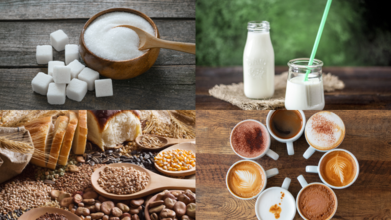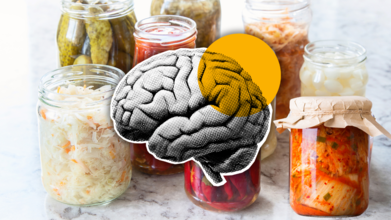- Health Conditions A-Z
- Health & Wellness
- Nutrition
- Fitness
- Health News
- Ayurveda
- Videos
- Medicine A-Z
- Parenting
- Web Stories
Do You Need More Protein Or Just The Right Kind? Dietician Explains How To Make Smarter Choices

When it comes to nutrition buzzwords, protein is having a long-standing moment. It's promoted by fitness influencers, stamped across packaging, and touted as the secret to everything from muscle tone to satiety. But here’s the real question that deserves attention—do you actually need more protein, or do you just need smarter protein?
As the conversation around protein deepens, experts are calling for a shift in focus—from more to better. Ahead, we dive into what science and dietitians say about protein requirements, the risk of deficiency, and how to choose protein sources that are not just effective, but smarter for your long-term health.
Protein isn’t just for bodybuilders. It's a fundamental building block of life, essential for the structure and function of your muscles, skin, enzymes, hormones, and nearly every cell in your body. Alongside carbohydrates and fats, protein is a macronutrient—meaning your body needs it in large amounts to function properly.
"Protein is critical not only for muscle repair but also for immunity, metabolic function, and hormone regulation," explains Dt. Vaidehi Nawathe, Chief Dietitian at Bhaktivedanta Hospital & Research Institute. “Its role in health spans far beyond just bulking up at the gym.”
Are You Getting Enough Protein? Signs of Deficiency
Despite its importance, many people may be consuming far less protein than they actually need, especially in developing countries and even among affluent urban populations.
Common signs you may not be getting enough protein include:
- Feeling hungry shortly after meals
- Fatigue or lack of energy, especially post-workout
- Poor recovery after illness or exercise
- Hair thinning, brittle nails, or weakened skin integrity
“If you're constantly snacking, feel sluggish or take longer than usual to bounce back from workouts or the flu, protein might be lacking in your diet,” says Nawathe.
Also Read: Not Cleaning Your Face Before Sleeping? These Tiny Bugs Might Be Feasting On Your Skin
Experts note that satiety and muscle recovery are strong indicators of adequate protein intake. If you feel full between meals and recover well, you're likely meeting your protein needs.
What Are Standard Protein Requirements?
How much protein you need daily depends on a variety of factors: age, gender, body weight, activity level, and overall health goals. On average:
- 10–15 grams per snack
- 20–35 grams per meal
Yet numbers only tell part of the story. Instead of obsessing over numbers alone, focus on making smarter protein choices that deliver more than just amino acids.
Hidden Protein Deficiency Crisis
Protein deficiency is a global health concern—but not in the ways we often imagine. According to Nawathe, “Protein deficiency is not just a problem of poverty or undernourishment. It’s surprisingly rampant even among the urban rich.”
In India alone, an alarming 73% of the urban population is protein deficient, often consuming only 10 to 30 grams per day, when the recommended intake ranges between 60 to 90 grams. That’s a serious gap, especially for pregnant women, older adults, and those recovering from illness.
Unlike iron or calcium deficiencies, protein deficiency often goes unnoticed, leading to chronic fatigue, poor immunity, and long-term health complications.
It’s not just about how much protein you consume, but what kind.
“There are endless protein powders on the market, but not all are created equal,” warns Nawathe. Her recommendation? Look beyond standard whey or meat-based options and explore plant-based protein powders—particularly those fortified with fiber, probiotics, and omega-3s (like DHA).
Smart protein choices include:
- Pea protein + Brown rice protein blends
- Formulas that include prebiotics and probiotics for gut health
- Low-GI protein options for blood sugar control
- Protein enriched with DHA for brain and heart support
These blends are not just good for muscle synthesis but also improve gut health, aid nutrient absorption, and support maternal health, particularly by reducing risks of gestational diabetes and preeclampsia in expectant mothers.
Also Read: Pop Star Jessie J Diagnosed With Early-Stage Breast Cancer; What Are The Signs Women Often Ignore?
Animal Protein vs. Plant Protein
While red meat and dairy-based proteins offer complete amino acid profiles, they may not be the best long-term choices for everyone.
“Animal protein, especially red meat, is high in saturated fats and cholesterol, which raises the risk of cardiovascular disease and some cancers,” says Nawathe. In contrast, plant proteins are anti-inflammatory, gut-friendly, and often more digestible.
Moreover, protein powders that taste good and mix well enhance compliance—because people are more likely to stick with nutrition habits that feel enjoyable.
The protein conversation is no longer about extremes. It’s about mindful nutrition—choosing sources that are holistic, balanced, and tailored to your needs.
If you're unsure about your protein intake or whether you're consuming the right kind, consult a registered dietitian who can assess your lifestyle, body composition, and health history.
Dt. Vaidehi Nawathe is Chief Dietitian at Bhaktivedanta Hospital & Research Institute in India
Sadhguru Says These 4 Foods Are Like Slow Poison For Your Body

Credits: Canva
Good health isn’t just about eating the right foods, it’s also about knowing what to avoid. Spiritual leader, Sadhguru, often emphasizes that certain foods we consume every day can silently harm our bodies over time. He calls them “enemies of health” and advises limiting or completely avoiding them.
Refined Sugar
According to Sadhguru, sugar as we consume it today is not the same as what our ancestors ate. Traditionally, sweeteners came from natural sources like jaggery or unrefined sugarcane juice. Modern white sugar, however, is highly processed and stripped of vitamins and minerals, leaving behind only “empty calories.”
Excessive sugar intake has been linked to obesity, diabetes, and heart disease. Sadhguru points out that it not only adds to weight gain but also weakens the immune system and disrupts the body’s natural balance. Choosing natural sweeteners like jaggery, honey, or fruits can be a healthier alternative.
However, Dr Palaniappan, who runs his YouTube channel under the name Dr Pal, a gastroenterologist says that jaggery or sugar do not really have that much of a difference. He explains that while 2 teaspoon of sugar have 8 grams of carbs, 2 teaspoon of jaggery have 6 grams of carbs. The difference is not that much, if your carbohydrate consumption is 200 grams per day. However, he does note that jaggery has a lower sugar spike.
Milk
While milk is often marketed as a superfood, Sadhguru suggests that most adults are unable to digest it properly. Many people lack the enzymes required to break down lactose, which can lead to bloating, mucus formation, and lethargy.
Although milk is a good source of calcium, Sadhguru recommends relying on other calcium-rich foods such as leafy greens, sesame seeds, ragi (finger millet), and nuts. Limited milk consumption is fine for those who tolerate it, but he advises against making it a daily habit for everyone.
The Physicians Committee for Responsible Medicine quotes Harvard Study that followed 72,000 women for two decades and found no evidence that drinking milk can prevent bone fractures or osteoporosis. The conclusion was milk does not necessarily build the strongest bones, though this is not to say that it has no nutrients. In fact, an estimated of 65% of the global population is lactose intolerant, majority of whom are from Asia.
Refined Grains
Modern refining processes remove the outer bran and germ from grains, leaving only the starchy endosperm. This process makes the grains last longer on shelves but takes away most of the fiber, vitamins, and minerals. As a result, refined grains like white rice and maida (white flour) provide little nutrition and cause rapid spikes in blood sugar.
Sadhguru encourages the consumption of whole grains such as brown rice, millets, and whole wheat to promote better digestion, sustained energy, and improved gut health.
Tea and Coffee
Tea and coffee may be morning essentials for many, but Sadhguru cautions against their overuse. These beverages act as nervous stimulants, giving a quick burst of energy but leaving the body more tired later. Habitual consumption can lead to dependency, sleep disturbances, and heightened stress levels.
He recommends gradually reducing intake and replacing these drinks with herbal teas, fresh juices, or simply water to maintain natural energy levels throughout the day.
Drink This on an Empty Stomach Every Morning for Faster Weight Loss and Better Digestion

(Credit-Canva)
Ever wondered if a simple change could make a big difference in your morning routine? While many of us reach for a cold glass of water or a hot cup of coffee, a medical expert is suggesting something else entirely: a warm cup of water. According to Dr. Kunal Sood, this seemingly small habit could be the key to kickstarting your day with surprising health benefits. It's an unusual but easy change that might just be worth trying.
Benefits of Warm Water
Dr. Sood points to three main reasons why starting your day with warm water on an empty stomach is a good idea. The first is that it can improve digestion. The theory is that warm water helps break down foods that your body might struggle with, making them easier to process. It may even help with constipation, as a 2016 study found that water heated to body temperature has a positive effect on bowel movements. This simple morning habit can help get your digestive system moving and prepare your body for the day ahead.
Aids Weight Loss
Another benefit of this simple habit is that it can help with weight loss. When you drink warm water, your body has to use energy to bring it down to your normal body temperature. This process gives your metabolism a slight, temporary boost. While it's a small change, that minor increase in your metabolic rate can help you burn a few extra calories over time. It's a simple, low-effort way to support your body's natural calorie-burning process, especially if you're trying to lose a little weight.
Boosts Blood Flow
Drinking warm water can also help improve your blood flow. The warmth causes your blood vessels to dilate, or widen. This widening effect allows blood to flow more easily throughout your body. Better circulation means oxygen and nutrients can be delivered more efficiently to your organs and muscles, which can make you feel more energized and ready to take on the day. It's a quick way to give your entire circulatory system a gentle and healthy boost.
What Happens When You Drink Cold Water?
Drinking cold water can actually make it harder for your body to do its job. It causes your blood vessels to shrink, which slows down digestion and makes it more difficult for your body to absorb water. Instead of focusing on getting nutrients from your food, your body has to work harder just to keep its temperature stable. This can cause you to lose water and feel less hydrated.
When you drink cold water right after eating, your body might create extra mucus. This could potentially weaken your immune system, making you more likely to catch a cold or other illnesses. For better digestion and hydration, it's often better to choose water at room temperature.
Some Precautions You Should Take Before Drinking Hot Water
Dr. Sood gives one final, very important piece of advice: make sure the water isn't too hot. It's crucial to be careful and check the temperature before you drink. You want the water to be comfortably warm, not scalding hot. Taking a moment to test it will prevent you from accidentally burning your mouth or throat. The goal is to make this a soothing, beneficial habit, not a painful one.
From Sauerkraut To Kombucha: How Fermented Foods Could Influence Neurotransmitters, Boost Mood And Reduce Anxiety

Credits: Health and me
Fermented foods have long been a staple across cultures for centuries, India's curd and pickles, sauerkraut of Europe, and kimchi of Korea. They are not only a matter of tradition and taste, but increasingly a solution to gut health, immunity, and wellness. Emerging science suggests they could quite possibly unlock improved mental health, influence neurotransmitters, and soothe anxiety and depression.
Fermentation is a natural process by which microorganisms such as yeast or bacteria break down complex food molecules. Not only is it self-preserving for foods, but it also enhances their nutritional content. As foods ferment, they release short-chain fatty acids that help digest food and nourish cells in the intestines. The process also makes the nutrients more accessible, producing B-vitamins, vitamin K2, bioactive peptides, and organic compounds like lactic and acetic acid. Enzymes developed during fermentation assist in the breakdown of carbohydrates, protein, and fat, and retard anti-nutrients such as phytates and oxalates facilitating mineral absorption such as iron, zinc, calcium, and magnesium.
Fermented foods typically contain live microbes, probiotics such as Lactobacillus and Bifidobacterium. Even if the microbes are killed, their waste, which are called postbiotics, retain the capacity to achieve health benefits.
The mantra "a healthy gut equals a healthy you" never rang more true. Fermented foods deliver beneficial bacteria that rebalance microbes, combat harmful microbes, and support digestion. Live-culture ferments provide metabolites in the form of short-chain fatty acids, bacteriocins, and organic acids that push out pathogens, lower gut pH, and promote good bacteria.
Fermentation also predigests carbohydrates and complex proteins, tenderizing food on the digestive tract. Enzymes in fermented milk help lactase-deficient individuals digest milk products easily. Additionally, the breakdown of antinutrients improves mineral absorption—a critical advantage over vegetarian diets.
How Fermented Foods Boosts Immunity?
A healthy immune system starts in the gut. By providing support for probiotic gut bacteria, fermented foods are able to modulate immune function, improve gut-barrier integrity, and cause regulatory T-cell responses that control inflammation. Yogurt, kefir, and fermented cereals stabilize intestinal flora, which can indirectly improve overall immunity and protect the body from infection.
What Is The Gut-Brain Axis?
Your gut and brain are in constant communication through what is known as the gut-brain axis. This "highway" connects the gut and central nervous system by nerves, hormones, and immune signals. A balanced gut microbiome can soothe inflammation, regulate neurotransmitter production, and influence mood and thought. An imbalanced gut, however, can contribute to depression, anxiety, and cognitive decline.
Research more and more points towards fermented foods to be the key players in this regard. Research in EMBO Molecular Medicine identified probiotic-rich fermented foods to reduce depression and anxiety. In a mice study, mice with probiotics from fermented foods showed less stress and anxiety-like behaviors. The mechanism is through modulation of neurotransmitters such as gamma-aminobutyric acid (GABA), which controls nerve activity in the amygdala area of the brain—the brain region responsible for fear and emotion.
How Fermented Foods Influence Neurotransmitters?
The gut microbiome has a direct influence on the production of neurotransmitters. Nearly 95% of the neurotransmitter serotonin, the "feel-good" one, is produced in the gut. The probiotics in fermented foods can influence serotonin and other neurotransmitters like dopamine and GABA, which have a direct influence on mood, anxiety, and sleep. In essence, what you eat can influence how you feel directly.
Benefits for Specific Health Conditions
Fermented foods are helpful in an array of conditions:
Gastrointestinal illnesses: Yogurt, kefir, and curd rice can restore intestinal balance with antibiotic therapy or occasional IBS.
Lactose intolerance: Cultured milk is more easily digested.
Mineral deficiency: Fermented legumes and cereals increase iron and zinc bioavailability.
Oral and vaginal health: Food containing lactobacillus might maintain healthy bacterial counts.
However, fermented foods must be eaten under careful circumstances: immunocompromised people, histamine intolerance, active SIBO, or hypertensive patients have to hold back on aged or high-sodium ferments. Pregnant women should opt for clean, pasteurized sources to play it safe.
Tips to Eat Fermented Foods Effectively To Reap Mental Health Rewards
For best mood-boosting effects of fermented foods, choose products with live and active cultures. Pasteurized products have zero live probiotics and therefore are less effective. Notably, fermented alcoholic beverages like beer or wine do not have the same probiotic effects.
Yogurt and Kefir: Both have Lactobacillus and Bifidobacterium, linked to reduced anxiety and depression.
Kimchi and Sauerkraut: Rich in lactic acid and prebiotic fibers to nourish beneficial bacteria.
Miso and Tempeh: Provide brain-benefiting probiotics and amino acids that assist with mental health.
Steer clear of excessive sodium and sugar, since excessive intake can disrupt gut microbiome balance and eliminate the benefits.
What Is Nutritional Psychiatry?
Nutritional psychiatry encourages paying attention to food's impact on mood. A convenient technique is a two-to-three-week trial period of a "clean" diet free from processed foods and sugar and tracking changes in body and mind. Gradual reintroduction of foods allows you to identify the foods that enhance or hamper your mood, showing the strong link between diet, gut microbiome, and mental health.
While fermented foods contain strong benefits, moderation is the key. Bloating, gas, or an upset stomach can happen in a few individuals if they overindulge. For most individuals, incorporating a variety of fermented foods in a total balanced diet is the best means to get both gut and brain reward.
Fermented foods are more than a culinary or cultural trend—potentially, they are a gateway between gut health, diet, and mental wellness. By affecting neurotransmitters, supporting gut microbiota, and enhancing nutrient absorption, fermented foods offer tangible value to mood regulation, anxiety alleviation, and overall health. Incorporating live-culture ferments like yogurt, kefir, kimchi, and miso into your daily regimen might be an easy yet potent way to improve both brain and body.
© 2024 Bennett, Coleman & Company Limited

